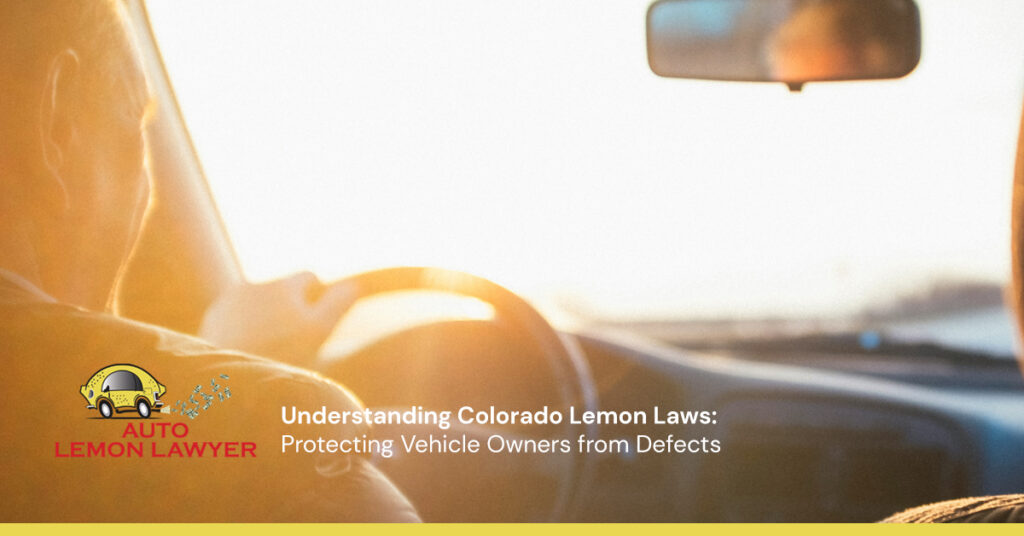When you invest in a new vehicle, you expect it to perform reliably and safely. Unfortunately, some vehicles come with persistent defects, causing ongoing frustration and financial strain for consumers. This is where Colorado’s Lemon Law comes into play, offering critical protection to those who find themselves with a faulty vehicle.
What Is Colorado’s Lemon Law?
Colorado’s Lemon Law, outlined in Colorado Statutes 42-10-101 through 42-10-107, protects consumers who purchase defective new vehicles that fail to meet performance and quality standards. The law ensures that manufacturers repair, replace, or refund vehicles that do not conform to the manufacturer’s express warranty after a reasonable number of repair attempts.
Key Definitions in Colorado’s Lemon Law
Under Colorado Statutes, a “consumer” includes any person who purchases or leases a motor vehicle for personal, family, or household use and anyone who is entitled to enforce the manufacturer’s express warranty. A “motor vehicle” refers to self-propelled private passenger vehicles designed primarily for travel on public highways but does not include motor homes or vehicles with three or fewer wheels.
The “warranty” refers to the written warranty provided by the manufacturer, detailing the terms and conditions under which repairs or replacements are covered.
What Constitutes a Lemon?
Under Colorado Lemon Law (42-10-103), a vehicle is considered a lemon if the manufacturer is unable to repair a defect that substantially impairs the use or market value of the vehicle after a reasonable number of attempts. A reasonable number of attempts is generally presumed to be:
- Four or more failed repair attempts for the same issue within the warranty term or one year of delivery (whichever comes first), or
- The vehicle is out of service for 30 or more cumulative business days due to repair issues during this period.
If either of these conditions is met, the manufacturer must either replace the vehicle with a comparable new one or provide a full refund, including the purchase price, sales tax, license fees, and registration fees, minus a reasonable deduction for the consumer’s use of the vehicle.
Manufacturer’s Duty to Repair
According to 42-10-102, if a motor vehicle does not conform to the manufacturer’s express warranty and the consumer reports the issue within the warranty period or one year of the vehicle’s original delivery (whichever is earlier), the manufacturer or its authorized dealer must repair the defect. Even if the repair occurs after the expiration of the warranty or the one-year period, the manufacturer is still responsible for correcting the defect.
Remedies for Consumers
When a vehicle meets the conditions of a lemon under Colorado Lemon Law, the manufacturer must provide one of the following remedies:
- Replacement: The manufacturer must replace the vehicle with a comparable model.
- Refund: Alternatively, the manufacturer may offer a refund of the full purchase price, including all associated fees (sales tax, registration fees), minus a reasonable allowance for the vehicle’s use prior to the first report of nonconformity.
Consumers must provide written notification to the manufacturer, typically by certified mail, giving the manufacturer an opportunity to cure the defect before pursuing legal remedies. This written notice is a crucial step to ensuring your rights under the Lemon Law are upheld.
Defenses for the Manufacturer
There are certain affirmative defenses under the law (42-10-104) that manufacturers can use to challenge a Lemon Law claim, such as:
- The defect does not substantially impair the use or market value of the vehicle.
- The defect is the result of abuse, neglect, or unauthorized modifications by the consumer.
Time Limit to File a Claim
Per 42-10-107, consumers must file any legal action within six months following the expiration of the warranty or one year from the original vehicle delivery date, whichever is earlier. The statute of limitations can be tolled if the consumer submits to arbitration under the law.
Lemon Law and Other Protections
Colorado Lemon Law does not limit other remedies available to consumers under state or federal law, including rights under the federal Magnuson-Moss Warranty Act. This Act provides additional protection for consumers, requiring that manufacturers make repairs within a reasonable number of attempts and allowing consumers to recover attorney fees if they prevail in a Lemon Law case.
Contact the Auto Lemon Lawyer – Kevin R. Duck
If you believe you’ve purchased a defective vehicle under Colorado’s Lemon Law, having an experienced attorney is essential. Kevin R. Duck, the Auto Lemon Lawyer, brings over 30 years of experience fighting for consumers. With his expertise in complex consumer litigation, Kevin has recovered millions of dollars for clients just like you.
When you choose Kevin R. Duck, you are choosing a trusted partner who will work tirelessly to navigate the complexities of Lemon Law and ensure you receive the compensation you deserve. Contact us today for a consultation, and let us help you take full advantage of Colorado’s Lemon Law protections.

Over the past 30 years, I have been devoted to standing up for consumers, tackling intricate class action consumer litigations, handling complex multi-district cases, and recovering millions of dollars for my Lemon Law clients. Being admitted in District Courts in Louisiana, Texas, California, Michigan, Florida, and Indiana, my practice has led me to represent clients all over the United States in my Lemon Law cases. Regardless of your location, my firm is committed to offering the highest level of professional support, especially in Lemon Law.

